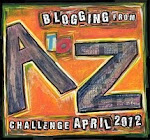Socially awkward? Don’t make me disintegrate you!
 Stereotypes are just oh so convenient, being a sort of shorthand generalization that encompasses so much in so little space. Work as a television writer? Need to instantly identify a throwaway character as a bad guy? Toss in the shaven-headed, tattooed Hispanic male wearing a white undershirt and baggy pants. Instant identification from the audience. “He looks like a bad guy; therefore, he’s a bad guy.” Next, spice up the dialogue with a few Spanish words, especially if they’re delivered with a noticeable accent and bad grammar. Example when addressing a female detective: “I ain’t gonna talk, chica.” More instant identification from the audience. “Ooh, he speaks a foreign language, and he’s disrespectful to both authority and women; therefore, he’s a bad guy.”
Stereotypes are just oh so convenient, being a sort of shorthand generalization that encompasses so much in so little space. Work as a television writer? Need to instantly identify a throwaway character as a bad guy? Toss in the shaven-headed, tattooed Hispanic male wearing a white undershirt and baggy pants. Instant identification from the audience. “He looks like a bad guy; therefore, he’s a bad guy.” Next, spice up the dialogue with a few Spanish words, especially if they’re delivered with a noticeable accent and bad grammar. Example when addressing a female detective: “I ain’t gonna talk, chica.” More instant identification from the audience. “Ooh, he speaks a foreign language, and he’s disrespectful to both authority and women; therefore, he’s a bad guy.”
Simple, huh?
The only problem with the syllogisms that stereotypes tend to prompt is that they’re not really syllogistic. Straight from “looks bad” to “is bad” is not a reasonable conclusion, but the images aren’t meant to be reasonable. They’re meant to evoke responses based on prejudice in order to create a quick, cheap emotional reaction as a substitute for thoughtful writing crafted to lead to a more authentic emotional investment and reflective conclusion.
And television isn’t the only medium that goes for the easy reaction. Watch The Avengers. It’s an entertaining movie full of paper-thin characters (but, to be fair, I’m certain no one meant for it be anything more). Now watch Spider-Man 2. Compare Loki with Doctor Octopus, and tell me the latter isn’t a much more interesting character. In comparison, Loki is just another stereotype (specifically, the neglected foster child jealous of the real son’s paternal relationship).
So, what does this have to do with gaming?
Attend a gaming convention. Even if you’re a gamer, you have to admit that some of the attendees look like geeks. Sure, not you, but certainly that guy over there. He most likely gets no exercise and is way too socially awkward. He certainly doesn’t date anyone outside of World of Warcraft taverns, probably lives at home with Mother (in the basement, of course), and you just know there’s a personal hygiene problem going on.
Sound familiar? If you’re a gamer, it’s dollars to donuts it does.
And, to be sure, it’s likely true about someone somewhere. That’s another convenient part of stereotypes. They’re always true at least some of the time, which only makes sense. All generalizations are ultimately false, which means they’re sometimes penultimately true.
But remember the advice about books and covers? I’m a gamer. I get some exercise. I don’t date, but that’s because I’m married. I haven’t lived at home with Mom since I was 17, and I never lived in Mom’s basement. My personal hygiene is impeccable, unless you count not shaving every day as a problem. None of my gamer friends fit the stereotype either. Last time I went to a convention, I gamed with about 20 or so strangers over the course of the weekend. Not a one of them was immediately identifiable as the stereotypical gamer. I mean, maybe they had hygiene problems, but, since I don’t have a sense of smell, I couldn’t tell. We didn’t talk much about living arrangements or dating either, but that’s not what we were at the convention to do.
Gamers go to gaming conventions to game. That means we walk into rooms and sit at tables with six or so strangers, and spend about four hours pretending to be hard-boiled pulp noir detectives, dwarven warriors, elven wizards, cape-wearing superheroes, and dauntless space explorers. We crack jokes, use bad accents, engage in Shatnerian feats of thespianism, and boldly save the day with humor and aplomb. We do this largely with the approval and encouragement of those strangers, and without fear of being judged or mocked. This sort of self-confidence and camaraderie is, in my experience, the norm for gaming convention attendees.
Whatever else that norm might be, what it ain’t is socially awkward.


